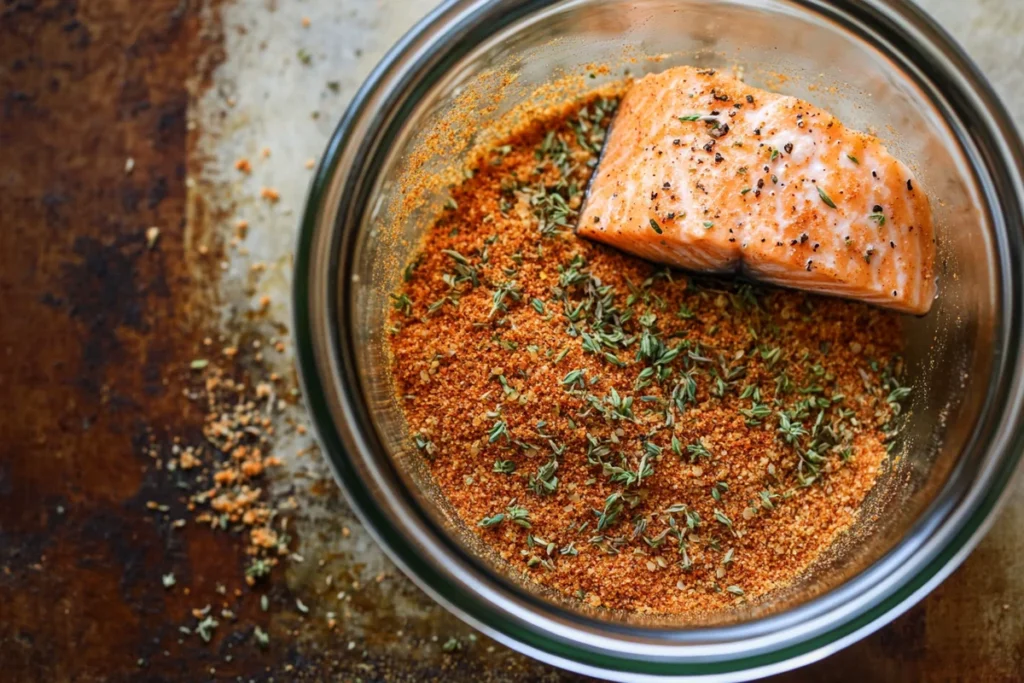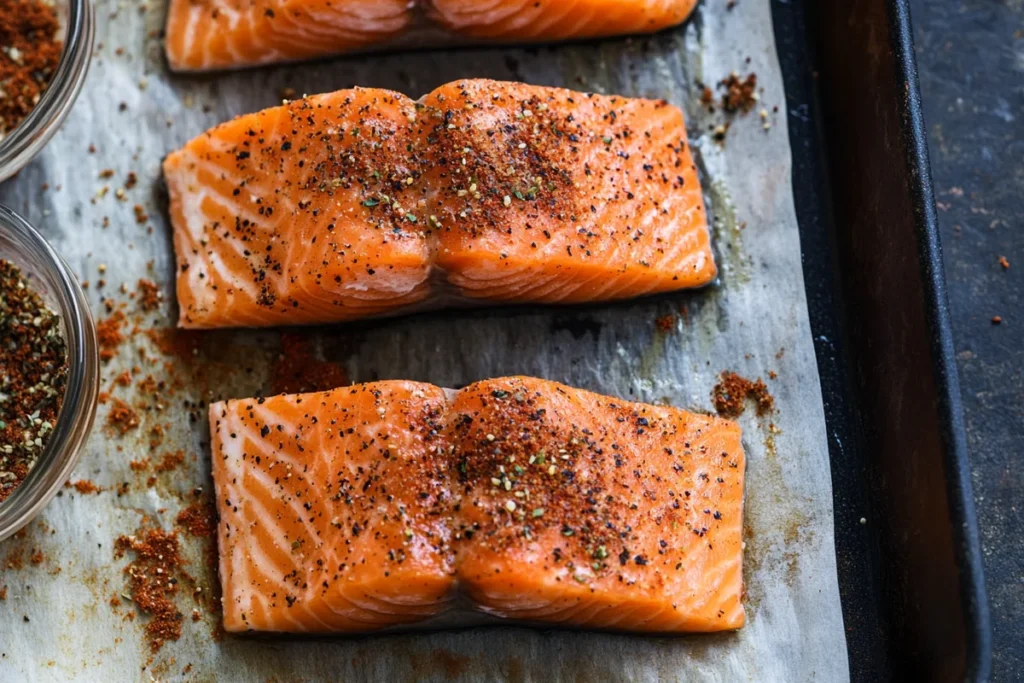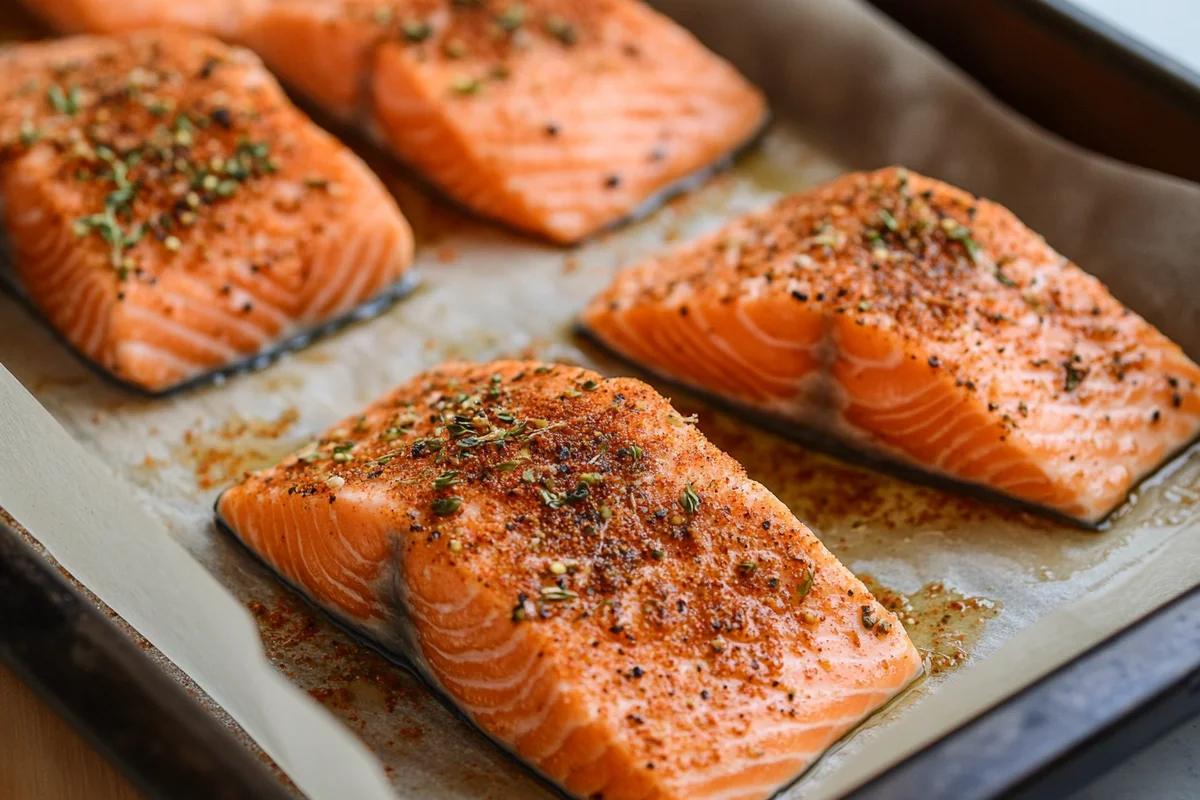Salmon is one of the most versatile and delicious fish, known for its rich, fatty texture and mild flavour. But what elevates salmon from good to great is the right choice of seasoning. Whether you prefer baked, grilled, or pan-seared salmon, the perfect blend of herbs, spices, and aromatics can transform your meal. This guide will break down what seasoning goes with salmon, explore a variety of flavour profiles and cooking methods, and offer specific seasoning recipes you can try at home.
Why Seasoning Salmon is Essential
Salmon already has a distinctive, slightly sweet flavour, but the taste becomes genuinely extraordinary when you pair it with the right seasonings. Seasoning is critical because it:
- Enhances the natural flavour: A good seasoning will highlight the inherent richness of salmon.
- Adds layers of taste: From earthy spices to zesty citrus, the right blend brings complexity to each bite.
- Balances texture: Seasonings like salt or spice rubs can help create crispy skin when grilled or pan-seared.
Salmon is a blank canvas that can take on a wide range of flavours, from savoury to spicy, herby to citrusy. Understanding what seasoning goes with salmon can ensure every dish is as delicious as possible.
Best Seasonings for Salmon: A Breakdown
The world of seasonings for salmon is vast, and the best depends on your preferred taste and cooking method. Here’s a closer look at some of the top seasonings for salmon cooking.
- Classic Seasoning Combinations
The first place to start when thinking about what seasoning goes with salmon is the classic pairings that never fail:
- Lemon, garlic, and dill: The brightness of lemon cuts through the richness of the fish, while garlic adds depth, and dill offers a fresh, herbaceous note. This is perfect for almost any cooking method, especially grilling or baking.
- Salt, pepper, and olive oil: Simple yet incredibly effective, these three ingredients enhance the natural flavours of salmon without overwhelming them. Salt amplifies the taste, pepper adds a slight kick, and olive oil ensures the fish remains moist.
- Herbs like thyme and parsley: Combining thyme and parsley can work wonders if you’re looking for something herby. Thyme gives a subtle earthy flavour, while parsley offers freshness.
These seasonings are light yet flavorful, making them ideal for highlighting the natural characteristics of the fish.
Herbs That Pair Well With Salmon
Fresh and dried herbs can elevate salmon dishes, providing either a delicate or intense flavour:
- Fresh herbs: Dill, parsley, cilantro, and tarragon work incredibly well with salmon. Fresh dill is the most well-known herb for salmon, especially in dishes like gravlax or smoked salmon.
- Dried herbs: Thyme, rosemary, oregano, and bay leaves are excellent choices. They can stand up to more robust cooking methods like grilling or roasting.
- Herb blends: Use herbs like Italian seasoning, herbes de Provence, or za’atar for a Mediterranean twist. These blends combine multiple herbs to create complex flavour profiles.
If you’re using fresh herbs, it’s best to add them toward the end of the cooking process to maintain their freshness. Dried herbs, on the other hand, can be added earlier.
Spices That Pair With Salmon
Spices add depth and warmth to salmon, perfect for when you want to experiment with more robust flavours:
- Paprika: Whether smoked, sweet, or hot, paprika brings warmth and a slight smokiness to the fish.
- Cumin is another earthy spice that pairs well with salmon, especially in Mexican or Middle Eastern-inspired dishes.
- Cayenne and chilli powder: Cayenne pepper and chilli powder are perfect for creating a spiced rub with a kick if you like your salmon.
- Ginger: Fresh or ground ginger can add a zesty punch to your dish, especially when paired with soy sauce and garlic for an Asian-inspired salmon recipe.
Spice are ideal for creating dry rubs or spice blends, which can be rubbed directly onto the fish before cooking. They offer bolder flavours than herbs and are often used in blackened or BBQ-style salmon recipes.
- Citrus and Zesty Seasonings for Salmon
Citrus flavours like lemon, lime, and orange not only complement the richness of salmon but also brighten the entire dish:
- Lemon zest and juice: Lemon is a classic pairing for salmon because it balances the fish’s fattiness with its bright acidity. Zest the lemon for an even more intense citrus flavour.
- Lime and orange: For a twist, try lime or orange juice. Lime works well in spicy dishes, while orange adds a subtle sweetness that pairs beautifully with soy-based marinades.
- Vinegar: Besides citrus, light vinegar like rice wine vinegar or balsamic can add complexity and acidity.
Citrus is especially effective in marinades or drizzled over the fish before serving.
How to Apply Seasonings to Salmon
Dry Rubs vs. Marinades: What’s the Difference?

- Dry Rubs: These mixtures of spices and herbs are applied directly to the fish. Rubs can create a flavorful crust, especially when grilling or pan-searing. Common ingredients in dry rubs for salmon include paprika, garlic powder, brown sugar, and cayenne pepper.
- Dry rub recipe for grilled salmon:
- 2 tbsp paprika
- 1 tbsp brown sugar
- 1 tsp garlic powder
- 1 tsp cayenne pepper
- Apply the rub generously to the salmon fillets before grilling.
- Marinades: Marinades are typically liquid-based and include oils, acids (like lemon juice or vinegar), and seasonings. They are best for baked or broiled salmon, where the marinade can penetrate the fish, adding moisture and flavour.
- Simple lemon garlic marinade:
- 2 tbsp olive oil
- 2 tbsp lemon juice
- One minced garlic clove
- 1 tsp salt
Marinate the salmon for 30 minutes before cooking. Avoid marinating for over an hour, as the acids can break down the fish.
Seasoning for Different Cooking Methods
The way you cook salmon can significantly influence which seasonings will work best:
- Grilling: Grilled salmon benefits from bold flavours that can withstand the grill’s heat. Use rubs with spices like paprika, cumin, and chilli powder for a smoky, slightly spicy taste. Marinades with olive oil, lemon, and garlic also work well.
- Baking: Baking salmon allows for more delicate seasonings like fresh herbs and citrus. Lemon, thyme, and rosemary are perfect for baked salmon dishes. Try adding a glaze made from honey and soy sauce for a unique twist.
- Pan-searing: Pan-seared salmon develops a crispy skin, so more straightforward seasonings like salt, pepper, and paprika are often enough. Add a knob of butter and garlic toward the end for extra flavour.
- Seasoning Different Cuts of Salmon
Different cuts of salmon require different seasoning techniques:
- Whole fillets: Season the skin side of the fillet with salt and pepper for crispy skin, and use herbs and spices on the flesh side.
- Salmon steaks are thicker and can handle more robust seasonings, such as BBQ rubs or blackened seasoning.
- Skin-on vs. skinless: Skin-on salmon works best with dry rubs, while skinless fillets can handle marinades or butter-based seasonings.
Seasoning Recipes for Specific Salmon Dishes
- Seasoning for Grilled Salmon
For grilled salmon, you’ll want seasonings that hold up to high heat and add a touch of smokiness. Here’s a quick seasoning recipe:

- Ingredients:
- 2 tbsp olive oil
- 1 tbsp lemon juice
- 1 tsp garlic powder
- 1 tsp paprika
- Salt and pepper
- Instructions: Rub the mixture over the salmon fillet and grill for 8-10 minutes until cooked.
- Baked Salmon Seasoning
Baking salmon allows you to use more delicate flavours. A good herb-based seasoning mix can work wonders:
- Ingredients:
- 1 tsp dried thyme
- 1 tsp rosemary
- One clove of minced garlic
- 2 tbsp lemon juice
- Salt and pepper
- Instructions: Season the salmon, place it on a baking tray, and bake at 400°F for 12-15 minutes.
- Pan-Seared Salmon Seasoning
For pan-seared salmon, you want to focus on simple seasonings that bring out the best in the crispy skin and tender interior:
- Ingredients:
- 1 tbsp olive oil
- 1 tsp paprika
- Salt and pepper
- ½ tsp cayenne
- Instructions: Heat the oil in a pan and sear the salmon for 3-4 minutes on each side.
Frequently Asked Questions (FAQs)
What is the best seasoning for salmon?
The best seasoning for salmon depends on your taste preferences, but a classic mix of lemon, garlic, and dill works well for most cooking methods.
Should I season the salmon before or after cooking?
Season the salmon before cooking to allow the flavours to infuse. For an extra flavour burst, you can add a final sprinkle of seasoning after cooking.
Can you marinate salmon for too long?
Yes, marinating salmon for more than an hour can cause the flesh to break down due to the acidity in many marinades.
Is it better to use fresh or dried herbs on salmon?
Both fresh and dried herbs work well on salmon. Fresh herbs offer a brighter flavour, while dried herbs provide a more intense taste.
What seasoning goes best with grilled salmon?
Grilled salmon pairs best with bold seasonings, like smoked paprika, Cajun seasoning, or lemon garlic rubs.
By following these seasoning tips and recipes, you can easily prepare delicious salmon dishes with just the right balance of flavours. Remember to adjust your seasonings according to the cooking method and cut of the salmon you’re working with, and feel free to experiment with new combinations to find what works best for your tastes.

